The Twelve Labors of Hercules is a myth about the labors that Hercules (Heracles) had to perform as a part of his sentence after killing his own children.
Being one of the offsprings of Zeus’ affairs, Hercules has always been subject of Hera’s hatred. Hera tried to kill Hercules many times throughout his adventures or at the very least made everything in her power to torture him. It was one of those times when Hera made Hercules lose his mind temporarily and Hercules killed his own children during this craze. After a short while he was awakened from his state of madness and realized what he did in great sorrow and regret. He sought guidance from Apollo and was told by Apollo’s oracle that his punishment would be serving his cousin and archenemy, Eurystheus, the king of Mycenae and Tiryns for twelve years.
Hercules was assigned to perform twelve labors/tasks which were considered almost impossible to be fulfilled. However, Hercules managed to perform these labors successfully thanks to the help he got from Athena and Hermes. Having performed these labors was, indeed, the reason why Hercules has been rewarded with immortality in the end.
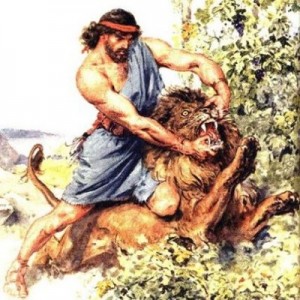
The Twelve Labors of Hercules are as it follows:
First Labor: Killing the Nemean Lion
The first labor Eurystheus assigned Hercules to was slaying the Nemean Lion and bringing back his skin. The Nemean lion was a very powerful beast born from Typhon and Echidna. It was a beast that could only be harmed by human hand and no other weapon could hurt it. Hercules realized that the beast was invulnerable after shooting him with an arrow and he went into the cave the beast lived in, held his neck tight and choked the Nemean Lion to the death. Hercules brought back the lion’s skin to Eurystheus and set on to fulfill his second task.
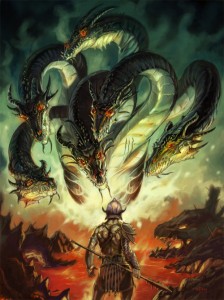
Second Labor: Killing Lernean Hydra
The second labor given to Hercules was to kill nine-headed Lernean Hydra. Taking his nephew, Iolaus, who was with him throughout many adventures, Hercules set on the journey to the lair of Lernean Hydra. Hercules lured the hydra out by shooting it with flaming arrows and he tried to capture it when the hydra came out. Every time he smashed one of the hydra’s heads, he saw that it was replaced by two heads. The Lernean Hydra even had a fiend ( a crab) biting Hercules in the foot during this struggle. Hercules called for his nephew’s help and Iolaus put fire on the heads of the hydra whenever Hercules cut off one. This seemed to do the trick and Hercules got rid of the Lernean Hydra.
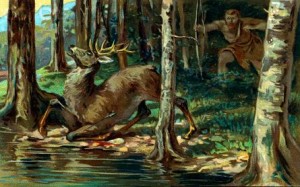
Third Labor: Capturing The Golden Hind of Ceryneia
Seeing that Hercules was still alive after slaying both the Nemean Lion and the Lernean Hydra, Eurystheus and Hera took their time to think of a more difficult task to give Hercules. This time they assigned him to capture the enormous Ceryneian Hind (Cerynitis) which was known to be sacred to the goddess Artemis (Diana in Roman mythology).
The Ceryneian hind was a aspecial a special deer with golden horns and bronze hoofs and more importantly, it was sacred to and the special pet of Artemis, meaning that Hercules could not kill or hunt the deer.
Hercules chased the deer for a year and when Cerynitis was about to cross the river of Ladon and run away from him, Hercules shot the animal with an arrow. On the way back Mycenae carrying Cerynitis on his shoulders Hercules met Apollo and Artemis. Being angry at him since he killed her sacred animal Artemis was about to punish Hercules but Hercules told him why he did it. Artemis healed the injured hind back to life and Hercules carried Cerynitis alive back to Eurystheus.
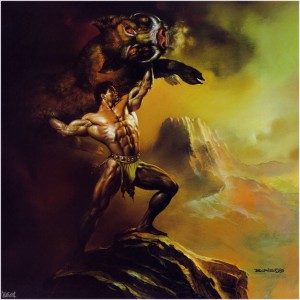
Fourth Labor: Capturing the Erymanthian Boar
The fourth labor of Hercules was to capture the Erymanthian Boar living on the mountain of Erymanthus. The boar was chasing down people and crushing and destroying everything on his way once he is out of his lair.
Throughout this journey, Hercules had the misfortune of causing his centaur friend Pholus’ death accidentally. While Hercules was chasing down some other centaurs after they had an argument with him, Pholus took one of the poisonous arrows that Hercules killed one of these centaurs with. The arrow slipped from his hands and fell on Pholus’ foot instantly killing him there.
After burying his friend Hercules found out the boar and chased and trapped him once the animal get tired of running and he brought the boar back to Eurystheus.
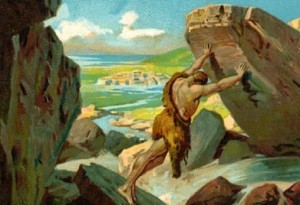
Fifth Labor: Cleaning the Augean Stables
As his fifth labor, Eurystheus asked Hercules to clean the whole Augean stables in which 1,000 healthy cattle lived and which were not cleaned for more than 30 years. Other than being almost impossible to perform, Eurystheus also wanted to humiliate Hercules by making him clean the feces of animals. Augeas, the owner of the stables, promised to reward Hercules with one tenth of his stock if he managed to clean the stables in one day as stated by Eurystheus. Hercules performed the tasked successfully by changing the direction of the rivers of Peneus and Alpheus, however, Augeas, did not fulfill his promise ending in Hercules killing him. Hercules then left the stables to Augeas’ son Phyleus.
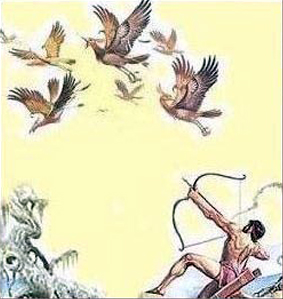
Sixth Labor: Defeating the Stymphalian Birds
Hercules was asked by Eurystheus to defeat the Stymphalian Birds as his sixth labor. These flesh-eating birds had bronze beaks and metallic feathers. They were sacred to the god of war, Area and their dung was poisonous.
Hercules did not know that there was such a huge flock of these birds before he arrived at the lake near Stymphalos. He did not know how to chase away these deadly birds, however, the goddess Athena came to help him. She gave Hercules some noisemaking clappers named krotala which were created by an immortal craftsman, Hephaistos, who was also known as the god of the forge. Hercules completed his task by climbing to the top of a mountain nearby, chasing the birds away by clashing the krotala and shooting them with his bow and sometimes by his slingshot.
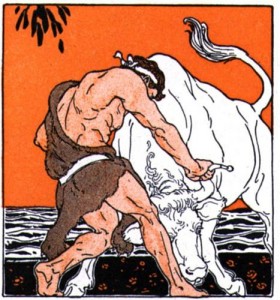
Seventh Labor: Capturing the Cretan Bull
The seventh labor of Hercules was about capturing the Cretan Bull, an animal which was believed to be the father of the minotaur (as a punishment for not fulfilling his promise Poseidon made Minos’ wife, the Queen of Crete, fell in love with the bull and she gave birth to the minotaur).
The bull was destroying everything on his way throughout Crete and that is why Minos aided Hercules in performing this task. Once he arrived at Crete, Hercules sneaked behind the animal, trapped him and sent it back to Athens.
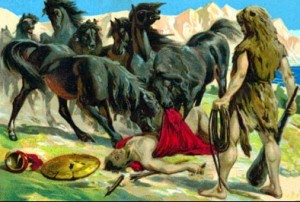
Eighth Labor: Stealing the Mares of Diomedes
As his eighth labor, Hercules was assigned to steal and bring back the mares (horses) of Diomede, the king of the Thracian tribe, Bistones. With the help of some volunteers, Hercules was able to drive the horses to the sea, however, Bistones sent soldiers after him to get back the stolen horses. In order to be able to fight these soldiers, Hercules had to leave the horses to Abderos. After defeating the soldiers Hercules learned that Abderos was, indeed, dragged to death by the horses and he founded the city of Abera in Abderos’ name to honor his death. Later, Hercules found the horses and took them back to Eurystheus.
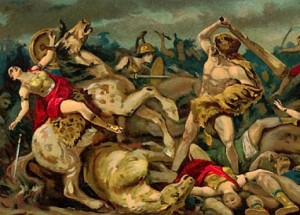
Ninth Labor: Obtaining the Belt of Hippolyte
Eurystheus asked Hercules to obtain and bring back the belt of Hippolyte, the queen of the Amazon warriors, as his ninth labor.
Hercules arrived to meet Hippolyte with some of his friends and being impressed with his skills Hippolyte was convinced to give him the belt. However, Hera was there under a disguise to cause hinder Hercules’ success and she spread rumors among the Amazons suggesting that these strangers were there to kidnap the queen of Amazons. When Hercules saw the Amazon warriors coming at him he thought this was an evil scheme devised by the queen and he killed Hippolyte and took the belt. He brought the belt back to Eurystheus, who was shocked he survived such an encounter with the Amazon warriors, and Eurystheus sent him to perform his tenth labor for capturing the Geryon’s cattle.
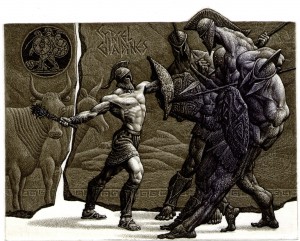
Tenth Labor: Capturing Geryon’s Cattle
As the tenth labor of Hercules, Eurystheus asked him to bring him the cattle belonging to the monster Geryon. Geryon was the son of Calirrhoe (daughter of two Titans, Oceanus and Tethys) and Chrysaor, who was the offspring of the Gorgon Medusa. He was a powerful monster with three pair of legs and three heads.
Not very long after Hercules reached Erythia, the island where Geryon lives, Geryon’s servant Orthus (brother of Cerberus), and the two-headed hound attacked Hercules and Hercules killed him and Eurytion who came to Orthus’ help. A herdsman witnessing these events let Geryon know what Hercules did and Geryon found and attacked Hercules while he was about to run away with the cattle. Hercules killed him by shooting him with arrows. Returning the herd to Greece was actually a more difficult task then stealing it. Hercules had to look for animals missing from the herd for many times but in the end he managed to bring the cattle back to Eurystheus after a long struggle.
Two Additional Labors
Hercules successfully performed the ten original labor Eurystheus have assigned to him, however Eurystheus did not count the slaying of Lernean Hydra and the cleaning of Augean stables since Hercules got help while slaying the hydra and it was actually the rivers that did the cleaning of Augean stables. So, he asked Hercules to fulfill two more labors in order to complete serving his sentence.
Eleventh Labor: Stealing the Apple of Hesperides
Hercules’ eleventh labor was one of the most difficult labors that Eurystheus assigned to him. Eurystheus wanted him to steal golden apples in the garden of Hesperides which were being protected by Ladon, a dragon with hundred heads and Hesperides, the nymphs who were daughters of Atlas.
When he set on his journey to steal the apples Hercules did not even know where the Garden of Hesperides was. So he traveled to Egypt, Arabia, Libya and Asia during which he had to have many unpleasant encounters.
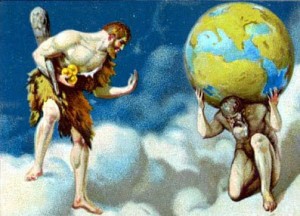 Upon being challenged Hercules had to fight Kyknos, the son of Ares, the god of war. After their fight was cut in the middle because of a thunderbolt Hercules went to Illyria and captured Nereus, the sea god, who was rumored to have known the location of the Garden of Hesperides. As he continued on his journey he met Antaues, the son of Poseidon, the god of sea. Antaues challenged him for a wrestling match and Hercules defeated him. Then came Busiris, another son of Poseidon who wanted to make him a human sacrifice, however, he managed to escape and also kill Busiris before his escape.
Upon being challenged Hercules had to fight Kyknos, the son of Ares, the god of war. After their fight was cut in the middle because of a thunderbolt Hercules went to Illyria and captured Nereus, the sea god, who was rumored to have known the location of the Garden of Hesperides. As he continued on his journey he met Antaues, the son of Poseidon, the god of sea. Antaues challenged him for a wrestling match and Hercules defeated him. Then came Busiris, another son of Poseidon who wanted to make him a human sacrifice, however, he managed to escape and also kill Busiris before his escape.
When Hercules came to Mount Caucasus he saw Prometheus, who was chained to the mountain since he tricked the gods, stole the fire from them and gave it to humans. Every day an eagle came to eat a part of Prometheus’ liver and left until his liver grew back the next day. Hercules killed the eagle and relieved Prometheus of that excruciating pain he had to endure for 30 years before these two met. In exchange of this good deed, Prometheus told him how he could get the apples from the Garden of Hesperides. He suggested Hercules to send Atlas, who has been holding the sky and the earth upon his shoulders, to get the apples for him. Atlas was very upset with holding the sky and the earth upon his shoulders all the time so he was easily convinced to go get the apples while Hercules did his job in his absence. However, when he came back Atlas told Hercules that he would be the one to deliver the apples to Eurystheus and Hercules would be holding this weight upon his shoulders from that time on.
As one of the rare points in his story where he used his wit instead of his physical power, Hercules faked to have agreed with this and he tricked Atlas into having the earth and sky on his shoulders again. He told Atlas if he will be doing this instead of Atlas he needed to put some soft padding on his shoulders and requested Atlas to have the earth and the sky upon his shoulder for a short time while he was putting them on. When Atlas lifted the weight again on his shoulders Hercules picked up the apples, ran away and brought them to Eurystheus.
Twelfth Labor: Capturing Cerberus Alive
As his final and the most dangerous labor, Hercules was assigned by Eurystheus to travel to the Underworld, kidnap the beast named Cerberus and bring him back.
Cerberus was the beast guarding the entrance to the kingdom of Hades and kept living creatures out of the world of the dead. He had three heads of wild hounds, he had snakes on the back of his body and he had the tail of a dragon or a serpent. He was the son of Echidna, a half-woman half-serpent monster and Typhon, a giant who had serpents and dragons all over his body and who can breathe fire.
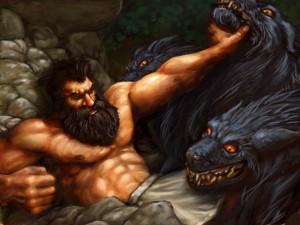 Hercules traveled the underworld and after defeating many monsters on the way he found Hades (Pluto in Roman mythology). He asked Hades where Cerberus was and the god of the Underworld said that he could actually take Cerberus with him if he could beat the beast just with his own brute power.
Hercules traveled the underworld and after defeating many monsters on the way he found Hades (Pluto in Roman mythology). He asked Hades where Cerberus was and the god of the Underworld said that he could actually take Cerberus with him if he could beat the beast just with his own brute power.
Hercules found Cerberus at the gates of the River of Acheron and after a very nasty fight he was able to capture the beast and bring him to Eurystheus.
For completing all these impossible tasks for Eurystheus, Hercules was rewarded by his father Zeus with immortality after his death. Hera also finally forgave him and let him marry her daughter, Hebe thereafter.

